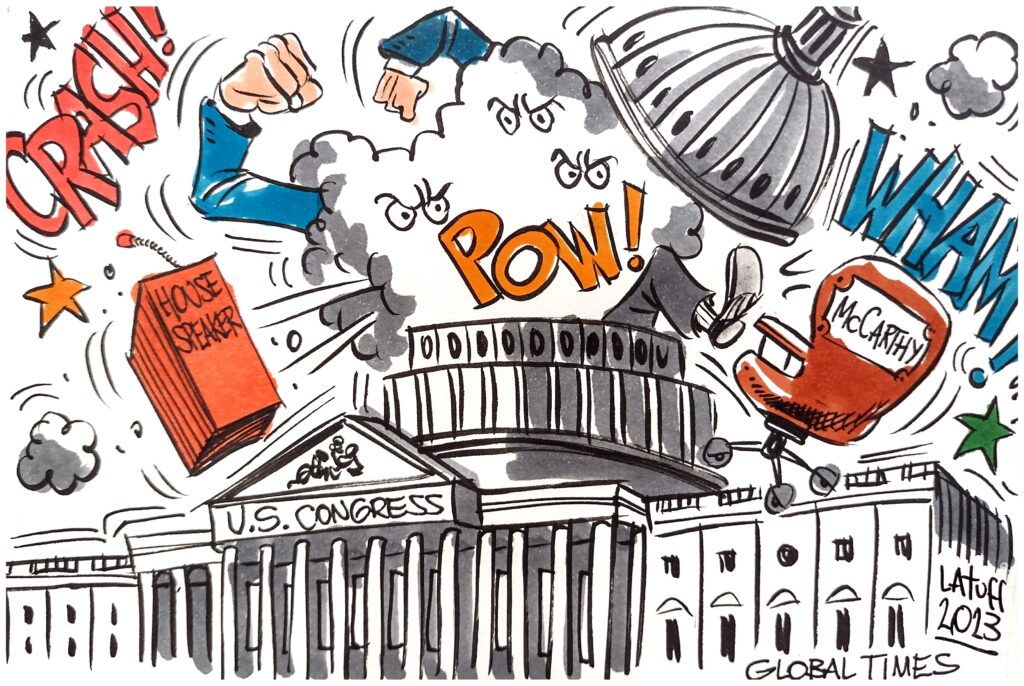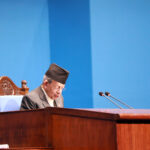Over the past few days, Washington encountered a once-in-a-century political standoff, and the whole world was watching the US House in chaos, which once again refreshed our understanding of US’ morbid politics.
Kevin McCarthy was elected House speaker in the early hours of Saturday morning in the 15th round of votes, which makes it the longest-running speaker election contest in 164 years, according to media reports.
Superficially, the crisis of the House speakership is due to some radical conservative lawmakers of the GOP being dissatisfied with McCarthy, but in essence, it is Washington’s deepened political polarization.
Political infight between the two parties and within both parties has grown to the extent in which it affects the normal functioning of not only the political parties, but also legislative branch. It signals the dysfunction of US political system, Yang Xiyu, a senior research fellow at the China Institute of International Studies, told the Global Times.
US politics is confronting the gravest predicament in a century. Against this backdrop, even though the speaker has been elected, it will be difficult for McCarthy to make a difference in domestic politics, and the country will suffer more political pain. The difficult election indicates that the widened division within the GOP and between the two parties will add a pile of uncertainty to McCarthy as a House speaker. In fact, the election has fully exposed McCarthy’s weak position. It will turn out to be difficult for him to lead the House.
Partisan politics will severely hit and distort the normal operation of Congress, especially the House. The bills and acts that the House needs to pass will be increasingly influenced by partisan struggle and internal struggle within the party. In this scenario, whether a bill can be passed will not be on the basis of the merits of the subject but on bargaining and making compromise.
Coincidentally, Friday, the day before McCarthy was elected, marked the second anniversary of the US Capitol riot. January 6, 2021 saw the Capitol Hill suffered mob attacks, while two years later, the twists and turns of the speaker election can be regarded as contempt and attack on the authority of Congress by several Republican lawmakers, said experts. Two years on, US’ political divide is intensifying rather than easing, and the quality of the US-style democracy is very astonishing. There are a rising number of observers questioning the self-correcting mechanism it has been touting.
As far as McCarthy’s career in the House is concerned, in the eyes of many Americans, he is a flip flopper with a poor record of integrity. No wonder the leading roles of the House of Cards, an American political thriller, regard McCarthy as a target to emulate.
The fact that a few far-right Republican lawmakers are trying to kidnap the GOP and paralyze the House has made more Americans disappointed with the US democracy, which has strayed away from the original intention of “a government of all the people, by all the people, for all the people,” and has been completely reduced to a job serving their own interests. This is a tragedy of US political practice, experts commented.
The difficult election for speakership also demonstrates that the House could go radical in its domestic and foreign policies, said some experts. In his maiden speech as speaker, McCarthy said, “We will address America’s long-term challenges: the debt and the rise of the Chinese Communist Party. The Congress must speak in one voice on these issues.”
McCarthy’s surname is easily reminiscent of Joseph R. McCarthy, the infamous Senator who led the communist witch hunts in the 1950s. The new House speaker shares many similarities with Joseph R. McCarthy in terms of anti-communist ideology.
In November 2022, McCarthy said he would form a select committee on China if he is elected speaker of the chamber, accusing the Biden administration of not standing up to Beijing, according to Reuters. In July, he said he would visit the Taiwan island if he becomes House speaker, which sounds really provocative.
Observers anticipated that with McCarthy as speaker, the Congress, or the House at least, will play the China card to the utmost extent in domestic and foreign policies, and treat the contest with China as a core agenda. China-US ties will face new challenges.
The US Congress has always been a “den of thieves” against China, while China evidently lacks roles corresponding to figures like McCarthy, Nancy Pelosi, Marco Rubio or Tom Cotton. The Chinese tend to be reasonable, and their voices are more consistent. In other words, China needs a few more “hawks” able to “bite” Washington.
(Global Times)




